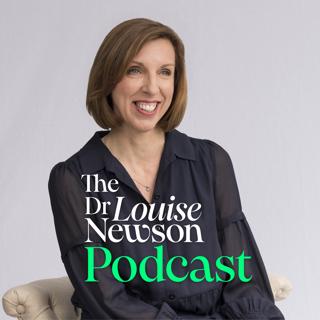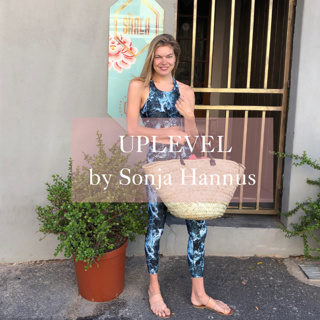
300 - New series: The Dr Louise Newson Podcast
A very exciting preview of what's to come in the new series of The Dr Louise Newson Podcast. Available to watch on YouTube
21 Maalis 1min

299 - Perimenopause and mental health in prison: Lisa’s story
Advisory: this episode contains themes of suicide and topics which listeners may find upsetting. In this week’s podcast Dr Louise Newson is joined by Lisa, who shares her deeply personal and challenging journey through perimenopause, mental health struggles, and the impact of her experiences on her family. Lisa discusses the devastating effects of her mental health decline, which led to a crisis point and ultimately a prison sentence for attempted murder. She also reflects on her time in prison, the realisations she had about her health, and the transformative impact of HRT on her recovery. The conversation also delves into the impact of hormonal changes on women's mental health and the often-overlooked connection between hormonal imbalances and criminal behaviour. Dr Louise and Lisa also discuss the importance of education around hormonal health, especially during perimenopause and menopause, to prevent tragic outcomes such as suicide and criminal behaviour. Click here to find out more about Newson Health. Contact the Samaritans for 24-hour, confidential support by calling 116 123 or email jo@samaritans.org
11 Maalis 27min

298 - What is healthy ageing?
This week, Dr Louise Newson is joined by Professor Cassandra Szoeke, academic professor, general physician, consultant neurologist and multi-award-winning clinical researcher and author. As principal investigator of the Women’s Healthy Ageing Project, the longest study of women’s health in Australia, she authored the book Secrets of Women’s Healthy Ageing and has several hundred published articles in academic journals. This week's episode explores the topic of healthy ageing, including the connection between inflammation and chronic diseases, the importance of physical activity, mental health, and the role of nutrition and gut health in inflammation. Dr Newson and Professor Szoeke also emphasise the need for a holistic approach to healthcare and the importance of prevention. Click here to find out more about Newson Health.
4 Maalis 31min

297 - Getting your voice heard: Christiane’s story of PMDD, endometriosis and menopause
Content advisory: this episode discusses themes of suicide and sexual assault. In this week’s episode, Dr Louise Newson is joined by Christiane Gurner, who shares her story of endometriosis and PMDD, highlighting the challenges many women face in getting a proper diagnosis and treatment. Christiane also shares her experiences of IVF and menopause at the age of 42. The conversation also covers the importance of listening to patients, individualising care and access to the right treatment, as well as the impact of hormone-related conditions on mental health. Christiane has written about her IVF experiences in the Sydney Morning Herald here (subscription required) and here, and menopause at 42 here. She can be contacted via email at christianewrites@outlook.com. Click here to find out more about Newson Health.
25 Helmi 30min

296 - Viagra: is it time to rethink the little blue pill for future health?
In this week’s episode, Dr Louise Newson talks to Professor Mike Kirby, president of the British Society for Sexual Medicine and author of more than 450 clinical papers and 32 books. He was previously director of the Hertfordshire Primary Care Research Network, visiting professor to the Faculty of Health and Human Sciences at the University of Hertfordshire, and was attending physician to the Prostate Centre, London, where he dealt with complex medical problems until 2020. Dr Newson and Professor Kirby discuss the importance of hormone health for both men and women, including testosterone. They also explore the benefits of phosphodiesterase inhibitors – which include Viagra – in treating not only erectile dysfunction, but their potential to reduce risk of cardiovascular disease, urinary symptoms, dementia, and even cancer. Professor Kirby is one of the speakers at the upcoming Newson Conference: The Hormone Blueprint, which will be held in London on 21 March. An event for healthcare professionals, the conference will delve into the far-reaching impact of hormones on the body. For more information and to book your place, click here. Click here to find out more about Newson Health.
18 Helmi 30min

295 - Natural progesterone: what mental health benefits can it bring?
Content advisory: this episode includes themes of mental health and suicide In this week’s podcast, Dr Louise Newson is joined by Consultant Psychiatrist Dr Rachel Jones to delve into the critical role hormones, particularly progesterone, play in women's mental health. They discuss the importance of understanding hormonal changes throughout a woman's life, the differences between natural and synthetic hormones, and the need for individualised treatment plans. The conversation emphasises the significance of balancing hormones and considering lifestyle factors that impact mental health. Dr Louise and Dr Rachel share insights on how natural progesterone can help with mental health symptoms, including mood and anxiety, and encourage women not to give up on finding the right hormonal balance for them. Click here to find out more about Newson Health. Find out more about Dr Rachel on Instagram @the_hormone_clinic Contact the Samaritans for 24-hour, confidential support by calling 116 123 or email jo@samaritans.org.
11 Helmi 31min

294 - Alcohol addiction and menopause: Rachel's story
Content advisory: this episode includes themes of mental health and suicide In this episode, Dr Louise Newson speaks with Rachel Birch, a doctor who shares her personal journey of menopause, mental health and alcohol addiction. Rachel discusses the lack of training on menopause in medical education, her experiences with anxiety and depression, how she found herself using alcohol as a coping mechanism and how she is navigating her recovery. Rachel emphasises the importance of self-advocacy, community support, and self-love in recovery. The conversation also highlights the need for better awareness and understanding of menopause and its impact on mental health. Rachel also shares the following advice if you find yourself struggling with addiction: Listen to your body and trust your instinct Be your own advocate – you know your body best Prevention is better than cure: be alert to drinking habits Don't suffer alone, reach out for help. Click here to find out more about Newson Health Contact the Samaritans for 24-hour, confidential support by calling 116 123 or email jo@samaritans.org.
4 Helmi 33min

293 - Navigating menopause in my 30s after ovarian cancer: Suzie’s story
Joining Dr Louise Newson on this week’s podcast is Suzie Aries, who shares her story of menopause following treatment for a rare and aggressive ovarian cancer in her 20s. Suzie talks about her cancer diagnosis and treatment, including raising £250,000 to fund treatment not available on the NHS. She also shares the realities of menopause at a young age, how HRT has helped her menopause symptoms, and why she takes HRT for her future health. Finally, Suzie offers advice for women on how to advocate for themselves during healthcare consultations, and why being knowledgeable, confident and curious is key. You can follow Suzie on Instagram @suzieclair11 and find out more about her story via her Facebook page Suzie Aries: kicking cancer's butt.
28 Tammi 30min






















